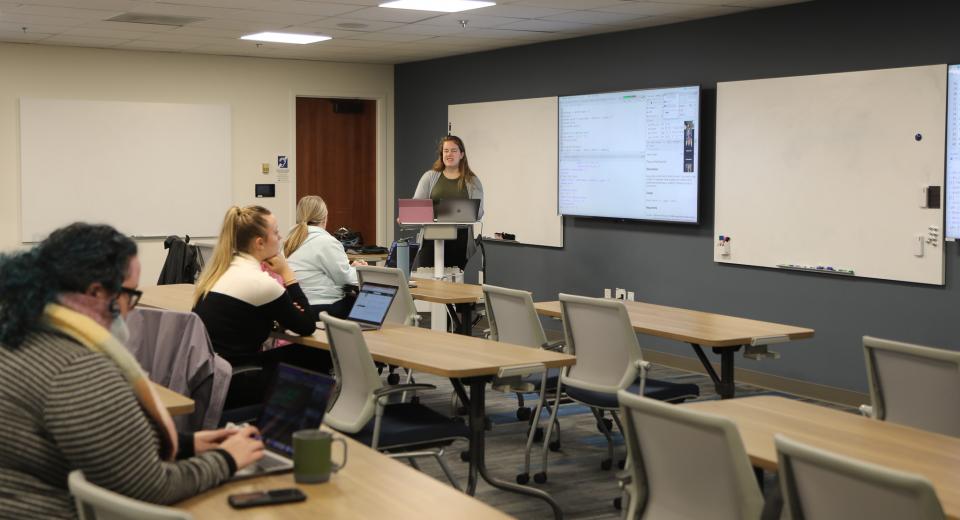Each term librarians lead free workshops for UO students and faculty. These cover topics from open education resources to citation management tools. The librarians instructing these workshops value information literacy and strive to provide learners with skills to be successful in any field. Most workshops are offered in a hybrid mode, making them accessible to participants anywhere with any learning preference. Learners at any level are encouraged to participate. Learn more about the current workshops schedule on the UO Libraries Calendar.

Open Education Resources
Our librarians recognize that textbooks can be expensive, so they’ve set up workshops educating instructors and faculty members about Open Education Resources (OER). These workshops cover what OER is, how to use it in courses, and how to find and adapt existing resources or create your own.
Allia Service, OER specialist, leads introductory and advanced Pressbooks workshops. Used to publish books online, the Pressbooks platform is helps users create open textbooks.
“Creating more Open Education Resources is important as it helps lower course material costs for students and helps make courses more financially accessible for them. Pressbooks is a great way to facilitate those OER,” Service said.
Head of Digital Publishing and Pedagogy Rayne Vieger teaches the OER and copyright workshops, leads textbook affordability efforts at the UO Libraries, and is an expert in open licensing and copyright.
She acknowledges, “The high cost of textbooks continues to overburden our students at the UO, and these workshops help raise awareness and highlight the experiences of UO students struggling to pay for course materials.”
Vieger added that those who attend the workshops will, “learn more about local textbook affordability data, how and where to find open education resources, and how to get started authoring their own open resources.”
Upcoming workshops focused on OER include:
- How to Create OER at UO: Introduction to Pressbooks, Nov. 2, Instructor: Allia Service
- Copyright & Licensing for Open Educational Resources, Nov. 14, Instructor: Rayne Vieger
Visit the current workshops schedule on the UO Libraries Calendar for the most current information and to register.
Data Management Tools
Data management can be intimidating, but workshops are designed to guide absolute beginners and those already in the field wanting to learn more about how programs like Python and R work. The instructors are passionate and want to educate any student or faculty member ready to learn.
Members of the Data Services team lead two workshops every term in Python and R, widely used languages for doing statistical analysis. Python is a broad language, dominant in machine learning, which is growing in popularity across many fields. R is used widely in statistics as well as in psychology, sociology, and education.
“One really great reason to attend these workshops is that these programs will be used in class, so getting a little more exposure can give you a better understanding of this new language,” Gabriele Hayden, head of data services shared.
She added that, “Although these programs are used in classes, that does not imply that they are taught within those classes. We are responding to what we see as the demand on campus. We hold workshops for these specific programming [tools] because we know they’re used in classes.”
Get Started
People learn in different ways. For some, having a workshop is an effective way to get an introduction to these tools and see what their capabilities are. The librarian instructors want these workshops to be accessible by any student or faculty member and encourage you to reach out with questions.
Make an appointment with a librarian to get individual help on these topics, especially if you can't make a workshop or have more specialized needs. Or take advantage of the statistical consulting services.
Signing up for workshops is simple. Visit the Library Events Calendar to choose the workshop that best meets your interests and needs.
—By Mona El-Haddar, communications assistant, UO Libraries
